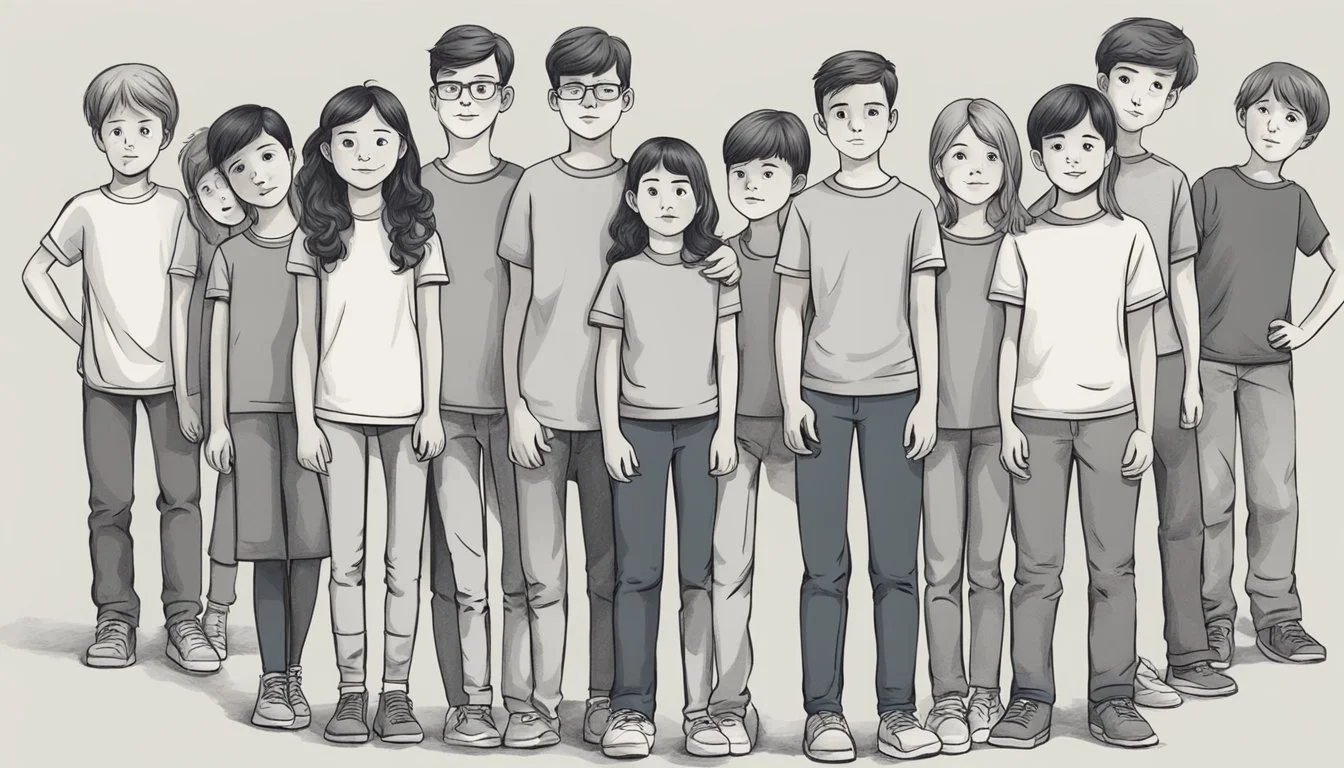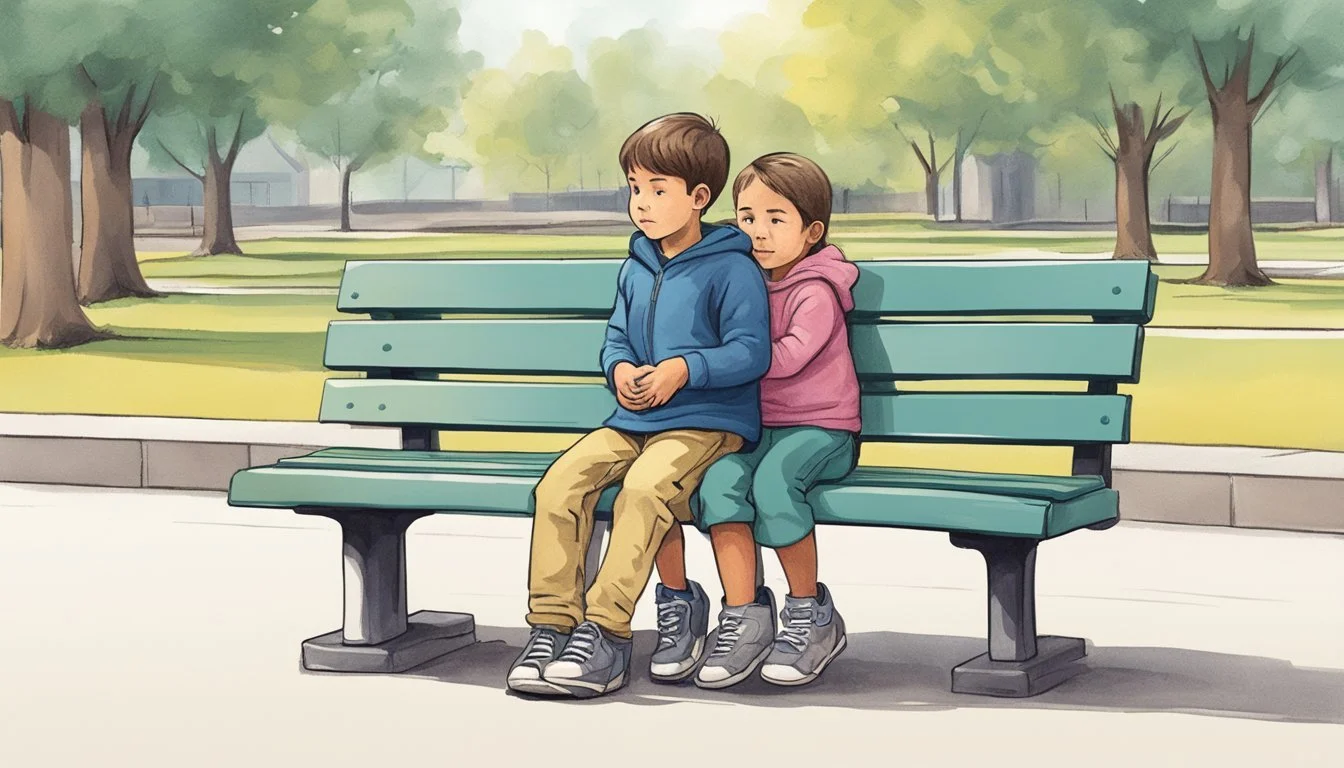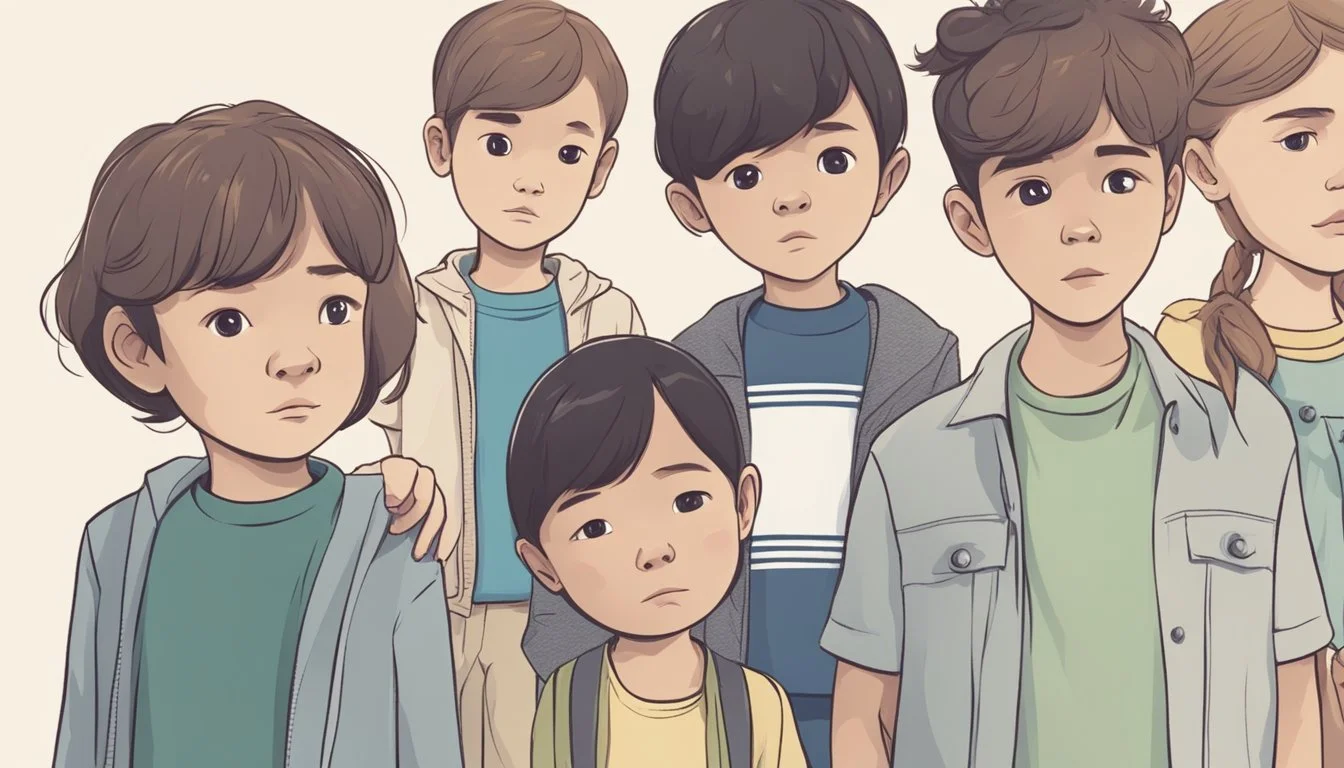13 Characteristics of Emotionally Neglectful Siblings
Signs and Impact
Family dynamics can significantly influence a person's emotional development. When siblings experience emotional neglect, these dynamics often manifest in various harmful ways. Emotional neglect in childhood can have lasting effects, from difficulties in forming healthy relationships to struggles with self-esteem and personal identity.
Understanding the characteristics of emotionally neglectful siblings can help in recognizing and addressing these issues. Such recognition is crucial for both personal growth and the improvement of family relationships. By identifying these traits, individuals can seek appropriate support and work towards healing and healthier interactions.
1) Lack of Empathy
Emotionally neglectful siblings often show a profound lack of empathy. They may fail to recognize or respond to the emotional needs and feelings of others. This indifference can be incredibly isolating.
Such siblings might not provide emotional support during tough times. Instead, they could be dismissive or indifferent, making it hard to form a deep emotional connection.
The inability to understand and share the feelings of others can lead to significant relational issues. This trait often results from the neglect and emotional detachment experienced during childhood.
In interactions, these siblings might appear cold or uninterested. They often struggle to engage in meaningful conversations that require emotional depth.
Their lack of empathy is not necessarily intentional but rather a consequence of their upbringing. Growing up in an emotionally neglectful environment can stifle the development of these essential social skills.
This deficiency can affect their relationships outside the family as well, making it difficult to form close friendships or partnerships.
2) Frequent Criticism
Emotionally neglectful siblings often engage in frequent criticism. This behavior can emerge from a lack of emotional support and understanding during childhood, leading to a habit of pointing out faults in others.
Criticism may be directed at physical appearance, achievements, or personal traits. It tends to undermine the recipient's self-esteem, causing them to doubt their abilities and worth.
Critics may not be aware of the negative impact their words have. The intent might not always be malicious; sometimes, it stems from their own insecurities and unmet emotional needs.
Routinely receiving criticism from a sibling can foster feelings of inadequacy and resentment. It becomes challenging to maintain a healthy relationship when positivity is consistently overshadowed by negative remarks.
Effective communication and mutual respect are vital in addressing this issue. Acknowledging the habit and making conscious efforts to be supportive can help improve the sibling dynamic.
3) Emotionally distant
Emotionally neglectful siblings often appear emotionally distant. This distance can manifest as a lack of empathy, minimal emotional sharing, and difficulty expressing feelings.
Such siblings may have grown up in environments where emotional needs were ignored or minimized. This upbringing can lead to an inability or unwillingness to form deep emotional connections.
They might struggle with active listening and acknowledging others' emotions. This can create barriers in relationships, making it hard for others to feel understood.
In some cases, emotionally distant siblings may seem indifferent to others' emotional experiences. This indifference can be a protective mechanism developed in response to their own emotional neglect.
Understanding these traits helps in recognizing and addressing the emotional gaps present in sibling dynamics. Identifying these patterns can open pathways for healthier communication and relationships.
4) Rarely Offers Support
An emotionally neglectful sibling often fails to provide support in times of need. This lack of support can manifest in various ways, such as not offering a listening ear during difficult times or not being available when their sibling seeks advice.
This behavior can create feelings of loneliness and isolation. Over time, the neglected sibling may begin to feel that they cannot rely on their sibling for emotional support, deepening feelings of neglect.
The lack of support may be unintentional. The neglectful sibling might be preoccupied with their issues or unaware of how to provide support effectively.
In some cases, the sibling might intentionally avoid offering support due to unresolved conflicts or a strained relationship. Emotional neglect in childhood can affect siblings differently, leading to varied coping mechanisms.
A relationship lacking support can contribute to strained family dynamics. It may also impact the long-term emotional health of the neglected sibling, making it difficult for them to seek support in other relationships.
Recognizing this pattern is the first step toward fostering healthier sibling relationships. Therapy and open communication can help siblings better understand and address their emotional needs.
5) Minimizes others' feelings
Emotionally neglectful siblings often minimize the feelings of their brothers and sisters. They might dismiss emotions by saying phrases like "you're overreacting" or "it's not a big deal." This can make the affected sibling feel invalidated and unheard.
These siblings may mock or belittle someone's feelings, making it difficult for the person to express emotions freely. They may insist that certain feelings are irrational or exaggerated, further adding to a sense of isolation.
Over time, this behavior can erode self-esteem and lead to difficulties in later relationships. Consistently minimizing feelings teaches the affected sibling to doubt their own emotions and suppress them in fear of ridicule or dismissal.
Being aware of this behavior is crucial for breaking the cycle of emotional neglect. It allows individuals to take steps toward validating their own feelings and seeking healthier family dynamics. Recognizing how minimizing feelings impacts others can prompt change and open communication in the family unit.
6) Avoids Deep Conversations
An emotionally neglectful sibling often avoids deep conversations. They might steer clear of anything that delves into feelings, meaningful topics, or personal issues. This behavior can create a sense of emotional distance and isolation within the family.
These siblings might change the subject when emotions are discussed. They may also exhibit discomfort when others express their feelings or share personal stories.
Such avoidance can result from a lack of emotional connection or insight from their upbringing. Often, emotionally neglectful parents fail to provide the tools needed for emotional communication, leading siblings to avoid deep discussions.
Emotional neglect often results in superficial family interactions. Conversations might remain on safe, surface-level topics, never addressing meaningful or emotional issues. This can hinder the development of close, intimate relationships among family members. Read more about the impact of emotional neglect within families at Psychology Today.
7) Resentment Towards Siblings
Emotionally neglectful experiences can foster deep-seated resentment among siblings. This often manifests when one is perceived to receive more emotional support or attention than the other.
For instance, a sibling might feel resentment if their brother or sister appears to have a closer bond with the parents. This can lead to feelings of isolation and bitterness.
Conflicts can also arise when one sibling bears more emotional burdens or responsibilities. These unequal dynamics create tension and long-term resentment.
The resentment doesn't always surface immediately. Sometimes, it smolders quietly, only becoming apparent in adulthood. Relationships may become strained, and old wounds resurface during family gatherings.
In some cases, the resentment is linked to a history of childhood emotional neglect. The neglected sibling might feel their emotions were undervalued compared to their siblings', leading to longstanding grievances.
Another factor is when one sibling becomes the scapegoat or is constantly compared unfavorably to others. This fosters an environment of competition instead of unity.
Ultimately, the root causes of this resentment are complex. Understanding these dynamics is key to finding resolution and improving familial relationships.
8) Shows Indifference
Emotionally neglectful siblings often exhibit a marked indifference toward each other’s emotions and well-being. This indifference can manifest as a lack of empathy or concern when a sibling is going through tough times. They may seem unfazed or uninterested, failing to offer support or acknowledge their sibling’s struggles.
They might not celebrate each other's achievements or milestones, displaying a general disinterest in their sibling’s life events. This behavior can create a sense of isolation and disconnect within the family dynamic.
This indifference isn't always intentional. It may stem from their own emotional neglect during childhood, making it difficult for them to engage emotionally with others. Emotional unavailability and detachment often arise from a lack of modeling healthy emotional behaviors during formative years, as described here.
This detachment can hinder the development of close, supportive relationships among siblings. When emotional needs during critical periods of development go unmet, it’s challenging to form deep emotional bonds later in life. As a result, indifference becomes a default response in their interactions.
Indifference can be especially damaging as it might not be overtly hostile, but it silently communicates a lack of care and presence. This can leave siblings feeling unimportant and emotionally neglected, perpetuating a cycle of emotional distance and detachment.
9) Inconsistent behavior
Inconsistent behavior is a common trait among emotionally neglectful siblings. They may appear loving and supportive on some days, yet distant and unresponsive on others. This unpredictability can create a sense of instability, leaving others unsure of what to expect.
Emotionally neglectful siblings may sometimes show genuine concern, only to revert to neglectful tendencies later. These fluctuating behaviors can lead to confusion and mistrust within the family. The lack of consistent emotional support can be particularly harmful.
This inconsistent behavior often stems from their own emotional struggles and unmet needs. Without a stable emotional foundation, they may find it challenging to maintain steady relationships. This can perpetuate a cycle of emotional neglect within the family dynamic. Frequent changes in their mood and engagement levels can also affect their siblings' emotional well-being, making it hard to form a reliable emotional connection.
In an emotionally neglectful family, parents may inadvertently reinforce this behavior by modeling inconsistency themselves. This learned behavior then trickles down to sibling interactions. The impact of this inconsistency can be long-lasting, affecting future relationships and emotional health. For more insights on emotionally neglectful families, you can explore information about emotionally neglectful families.
10) Rarely expresses love
Emotionally neglectful siblings often struggle to express love and affection. They may find it difficult to say "I love you" or show physical affection such as hugging.
They might avoid conversations that involve expressions of love or show discomfort when others display affection. Their actions can be perceived as cold or distant.
This lack of expressed love can leave their siblings feeling unappreciated or uncared for. This behavior often stems from their own unmet emotional needs during childhood.
Such siblings may not understand the importance of verbal and physical expressions of love in maintaining healthy relationships. Their inability to express love can be a significant barrier to forming deep emotional bonds with others.
11) Disregards Emotional Needs
An emotionally neglectful sibling often disregards the emotional needs of their brothers or sisters. This behavior manifests in several ways, such as failing to acknowledge or validate their sibling's feelings during times of distress.
They may avoid offering support or show indifference when their sibling is visibly upset or in need of comfort.
Communication is typically practical or superficial, lacking any genuine engagement with the sibling's emotional state. This can lead to a sense of isolation and misunderstanding within the family dynamic.
In some cases, the neglectful sibling might minimize or dismiss their sibling's emotions, suggesting they are overreacting or being too sensitive.
Such behaviors contribute to a pattern where the emotional well-being of siblings is consistently overlooked or undervalued. This lack of emotional recognition can cause long-lasting effects on the sibling’s self-esteem and emotional health.
The impact of emotional neglect can be profound, leading to feelings of worthlessness or invisibility. Siblings in such environments often struggle to form healthy emotional connections with others later in life.
Addressing this issue is crucial for improving familial relationships and individual mental health. Emotional support plays a critical role in the overall development and well-being of family members.
More information can be found on the impact of emotional neglect in families.
12) Difficulty in sharing emotions
Emotionally neglectful siblings often struggle to share their feelings. This difficulty stems from a familial environment where emotional expression is neither encouraged nor validated.
These siblings learn early on that their emotions will be met with indifference or even negative reactions. Over time, they internalize the belief that their feelings are unimportant or burdensome.
When attempting to express their emotions, they may feel awkward or vulnerable. This results in them avoiding such expressions altogether.
The fear of judgment or misunderstanding can also inhibit their willingness to open up. This sense of vulnerability makes emotional sharing seem risky rather than beneficial.
Their emotional vocabulary may be underdeveloped, making it hard for them to articulate what they feel. Without the right words, they may prefer to keep their emotions private.
Emotional neglect leads to isolation, as these individuals find it hard to connect with others on a deeper emotional level. Relationships tend to remain surface-level, lacking genuine emotional intimacy.
As adults, therapy can offer a safe space for them to learn how to identify and express their emotions. Professional guidance helps them develop healthier emotional habits and improve relationships.
13) Often Preoccupied with Self
Often, emotionally neglectful siblings can become preoccupied with their own needs and desires. This self-focus can make it challenging for them to notice or address the needs of others. They may seem indifferent or uninterested in the feelings and experiences of their siblings.
This preoccupation with self often stems from a lack of emotional support in their own upbringing. When caregivers do not provide adequate emotional validation, children may grow up feeling they need to prioritize their own needs just to get by.
Emotionally neglectful siblings may also have difficulty empathizing with others. They might struggle to put themselves in someone else's shoes, leading to an appearance of selfishness or insensitivity.
In some cases, self-preoccupation can result in behaviors that seem dismissive or uncaring. These siblings might fail to offer support during difficult times, adding to the emotional distance already present.
Emotionally neglectful siblings may spend a significant amount of time focused on their own goals and interests. They might seem absorbed in their personal pursuits, inadvertently neglecting meaningful interactions with their family members.
This self-centered approach can create a cycle where emotional neglect perpetuates further disconnection. Without intervention, the patterns of self-preoccupation can continue into adulthood, making it difficult to build strong, supportive relationships.
For more information, visit Verywell Mind.
Understanding Emotional Neglect in Sibling Relationships
Emotional neglect in sibling relationships can manifest differently for each individual. It's crucial to consider the various factors that contribute to these divergent experiences.
Definition and Overview
Emotional neglect happens when significant emotional needs are consistently unmet by parents or caregivers. This lack of emotional responsiveness can significantly impact siblings, influencing their emotional development and relationship dynamics.
For some, this neglect might lead to feelings of worthlessness and self-doubt, while others might develop resilience or independence. Factors such as personality, birth order, and individual coping mechanisms play roles in how each sibling is affected.
The way parents respond to each child can also vary, further intensifying emotional neglect's disparate effects within a family.
Common Causes and Triggers
Several variables contribute to emotional neglect among siblings. Parental stress, economic hardship, and mental health issues can impair a caregiver’s ability to meet their children's emotional needs. A parent’s inherent emotional capacity and their attachment style also affect how they interact with each child.
Differences in parental treatment based on gender or perceived abilities can be a significant trigger. For instance, parents might resonate more with a child who shares their interests or gender, creating an imbalance in emotional support.
The family environment, including high conflict or lack of communication, can exacerbate feelings of neglect, as siblings might find it challenging to express or process their emotions effectively. These dynamics underscore the complexity and varied nature of emotional neglect in sibling relationships.
Long-term Effects of Emotional Neglect Between Siblings
Emotional neglect among siblings can have far-reaching consequences on individuals' lives. The impacts are often most visible in their personal relationships and emotional well-being.
Impact on Personal Relationships
Emotional neglect between siblings can create significant challenges in developing and maintaining healthy personal relationships. Individuals who have experienced such neglect may struggle with trust and intimacy. They often find it difficult to form deep connections, fearing vulnerability and rejection.
They might engage in self-sabotaging behaviors, distancing themselves to avoid potential hurt. This behavior can lead to isolation and feelings of loneliness. Relationships with friends, partners, and even other family members can be impacted, often resulting in strained or superficial connections.
Communication issues are also a common problem. Those affected may have difficulty expressing their needs and emotions, leading to misunderstandings and conflicts. The lack of emotional validation growing up can make it hard for them to believe in the authenticity of their feelings, causing further confusion in interactions.
Emotional and Psychological Consequences
The emotional and psychological repercussions of sibling neglect are profound. These individuals often experience a range of negative feelings, including anxiety, depression, and low self-esteem. The internalized belief that their emotions are unimportant can persist into adulthood, impacting their mental health.
They might be hypersensitive to criticism or perceived signs of rejection, reacting strongly to stress and adversity. This heightened emotional sensitivity can make daily life stressful and challenging. Emotional neglect often teaches people to ignore or minimize their feelings, leading to emotional repression and difficulties in emotional regulation.
Therapy and support can play crucial roles in addressing these issues. Learning to identify and validate their emotions is an important step toward healing, allowing them to build healthier relationships and improve their psychological well-being.
Signs and Symptoms of Emotional Neglect in Sibling Dynamics
Emotional neglect in sibling dynamics can be subtle but profoundly impactful. Various behavioral and emotional indicators can help identify the presence of such neglect.
Behavioral Indicators
Emotionally neglected siblings may exhibit certain behaviors that reflect unmet emotional needs. These behaviors often include withdrawal from family activities and difficulty in forming healthy relationships outside the family.
They may show an aversion to teamwork activities, preferring solitary engagements. Often, these children will seem overly independent, avoiding reliance on others even in situations where cooperation is necessary.
Inconsistent academic performance can be another indicator. Emotional difficulties may impact concentration and motivation, leading to fluctuations in grades. Additionally, these siblings might display passive-aggressiveness or non-compliance as a form of silent protest against unmet emotional needs.
Emotional Symptoms
Emotionally, neglected siblings commonly experience feelings of isolation and loneliness. These feelings are often internalized, leading to issues like low self-esteem and a chronic sense of inadequacy.
They may struggle with emotional regulation, showing heightened sensitivity to criticism and difficulty managing frustration or anger. It’s not uncommon for these individuals to develop anxiety or depression due to persistent emotional neglect.
Furthermore, a lack of emotional validation from family members can lead to difficulties in identifying and expressing their own emotions. This hampers their ability to communicate effectively and can result in misunderstandings or conflicts in various social interactions.
An increased risk of self-sabotaging behaviors, such as procrastination or avoidance, may also be present. Emotional neglect can cause them to doubt their abilities and undermine their achievements.












